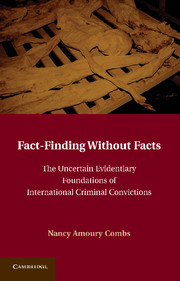 Fact-Finding without Facts
Fact-Finding without Facts Book contents
- Frontmatter
- Contents
- Acknowledgments
- Introduction
- 1 The Evidence Supporting International Criminal Convictions
- 2 Questions Unanswered: International Witnesses and the Information Unconveyed
- 3 The Educational, Linguistic, and Cultural Impediments to Accurate Fact-Finding at the International Tribunals
- 4 Of Inconsistencies and Their Explanations
- 5 Perjury: The Counternarrative
- 6 Expectations Unfulfilled: The Consequences of the Fact-Finding Impediments
- 7 Casual Indifference: The Trial Chambers' Treatment of Testimonial Deficiencies
- 8 Organizational Liability Revived: The Pro-Conviction Bias Explained
- 9 Help Needed: Practical Suggestions and Procedural Reforms to Improve Fact-Finding Accuracy
- 10 Assessing the Status Quo: They Are Not Doing What They Say They Are Doing, but Is What They Are Doing Worth Doing?
- Conclusion
- Bibliography
- Index
4 - Of Inconsistencies and Their Explanations
Published online by Cambridge University Press: 05 October 2010
- Frontmatter
- Contents
- Acknowledgments
- Introduction
- 1 The Evidence Supporting International Criminal Convictions
- 2 Questions Unanswered: International Witnesses and the Information Unconveyed
- 3 The Educational, Linguistic, and Cultural Impediments to Accurate Fact-Finding at the International Tribunals
- 4 Of Inconsistencies and Their Explanations
- 5 Perjury: The Counternarrative
- 6 Expectations Unfulfilled: The Consequences of the Fact-Finding Impediments
- 7 Casual Indifference: The Trial Chambers' Treatment of Testimonial Deficiencies
- 8 Organizational Liability Revived: The Pro-Conviction Bias Explained
- 9 Help Needed: Practical Suggestions and Procedural Reforms to Improve Fact-Finding Accuracy
- 10 Assessing the Status Quo: They Are Not Doing What They Say They Are Doing, but Is What They Are Doing Worth Doing?
- Conclusion
- Bibliography
- Index
Summary
Educational deficiencies, cultural divergences, and translation errors stand as significant fact-finding impediments that certainly account for many of the confused exchanges and nonresponsive responses that pervade international criminal trials. They also stand to explain another key problem bedeviling testimony at the international tribunals: inconsistencies. Investigators interview witnesses before they come to court, and they draft written statements purporting to contain the information that the witnesses conveyed to them. The problem is that a substantial proportion of witnesses testify inconsistently with their written statements or with their in-court testimony in previous cases. Although some of these inconsistencies are trivial, many are not. Indeed, this section will provide a great many examples in the text and considerably more in the footnotes to give a sense of just how prevalent the discrepancies between statements and testimony are and just how substantial. In short, a large proportion of international witnesses testify inconsistently about core features of the events that they ostensibly witnessed. These inconsistencies, if attributable to the witnesses, should call their testimony into considerable doubt. Section 4.A examines the kinds of inconsistencies that appear, Section B considers their prevalence, and Section C explores the causes of the inconsistencies.
THE NATURE OF THE INCONSISTENCIES
Discrepancies between statements and testimony cover a wide range of topics and are particularly apt to concern dates, distances, duration, numbers, and the other sorts of key details that international witnesses so often have trouble providing.
- Type
- Chapter
- Information
- Fact-Finding without FactsThe Uncertain Evidentiary Foundations of International Criminal Convictions, pp. 106 - 129Publisher: Cambridge University PressPrint publication year: 2010


